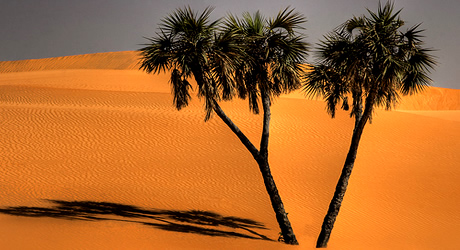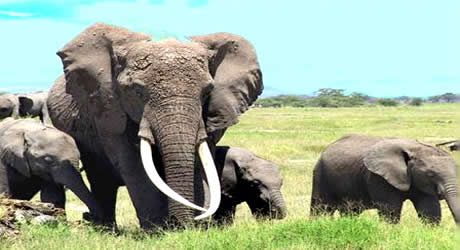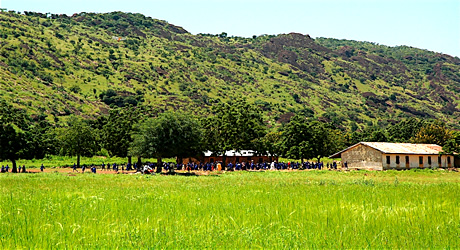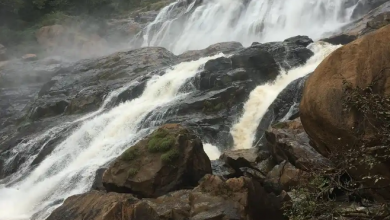Borno State – "Home Of Peace"
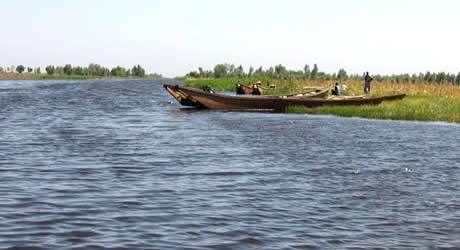
Located in north-east geopolitical zone of Nigeria, Borno State was created out of the defunct North Eastern Nigeria in 1976 and it is divided into twenty seven local government areas which include Abadan, Askira-Uba, Bama, Bayo, Biu, Chibok, Damboa, Dikwa, Gubio, Guzamala, Gwoza, Hawul, Jere, Kaga, Kala/Balge, Kukawa, Konduga, Kwaya-Kusar, Mafa, Maiduguri, Magumeri, Marte, Mobbar, Monguno, Ngala, Nganzai and Shani
History
The area known as Borno State today was originally part of the defunct North Eastern State which was one of the twelve states initially created in 1967. The old state was later divided into two by late General Murtala Muhammed’s regime in 1976 and this brought about Borno State.
Borno State known as ‘Home of Peace’ occupies the greater part of the Chad Basin and it is dominated by the Kanuri ethnic tribes. The State is known for its peaceful and hospitable nature despite its diverse differences in terms of history, religion, culture and languages amongst others.
People & Culture
Borno State has an estimated population of about 4,151,193 as at 2006 and population density of approximately 60 inhabitants per square kilometer. Borno State is quite heterogeneous with dominant ethnic groups such as the Kanuris (inhabit Abadam, Mobbar, Gubio, Guzamala, Kukawa, Nganzai, Monguno, Marte, Ngala, Kaka-Balga, Dikwa, Bama, Konduga, Mafa, Kaga, Magumeri, Damboa and Maiduguri LGAs.
Other ethnics groups are Shuwas (known as the Arabs inhabit Mafa, Jere, Marte, Monguno, Dikwa, Ngala, Kala-Balge, Bama and Koguda LGAs), Hausas (Askira, Maiduguri LGAs), Babur-Bura (Biu, Hawul, Kwaya-Kusar, Bayo, and Shani LGAs). Mandara (Gwoza LGA), Chibok (Chibok LGA), Ngoshe, Guduf, Tera and Fulani languages are Kanuri, Shuwa, Guduf, Marghi, Babur, Fulani, Waha, Hausa.
Most inhabitants of the state are farmers producing crops such as millet, rice, cassava, date palms, fruits, vegetables, sorghum, wheat, sweet potato, sugarcane, groundnut, cotton etc.
Public Notice:
It is advisable to be vigilant in Borno State and some other part of Nigeria cities/towns, visitors are advised to be careful while traveling around for safety purpose. Please seek additional advise from the Nigerian security agency. The federal and state governments are doing their best to protect life and properties.
[tab:Geography] Located within latitude 10 N and 14 N and longitude 11 30 E and 14 45 E, Borno State which has an area of 61, 435sq. km shares borders with Republic of Niger to the north, Republic of Chad to the northeast and Cameroon Republic to the east. It also share borders with Adamawa State to the south, Gombe State to the southwest and Yobe State to the west.
Weather/Climate
Borno state has a climate which is hot and dry for a greater part of the year although the southern part is slightly milder. The period of wet season varies from place to place due to the influence of the various climatic factors such as the direction of the rain-bearing winds and topography but generally the rainy season is normally from June to september in the North and May to October in the South with relative humidity of about 49% and evaporation of 203mm per year. The State has two major vegetation zones viz; Sahel in the North with severe desert encroachment covering most of the Chad Basin areas and Sudan Savannah in the South which consists of scrubby vegetation interspersed with tall tree woodlands.
Cities & Towns
Other important cities and towns include Maiduguri, Dikwa, Gwoza, Konduga, Bama, Monguno, Shani, Damboa etc.
The Gwoza Hills, with height of about 1300 meters above the sea level is made up of ranges of mountains/hills known as the ‘Mandara Mountains’ and provides beautiful scenery. These Mountains/hills form a natural barrier between Nigeria and Republic of the Cameroun, starting from pulka meandering towards Mubi and beyond. The mountains, with promenade-like paths along Gwoza dugi vicinity is conducive for mounatineering, trekking and picnicking – it has several streams, ponds, springs and is dotted with settlement by various tribes. Nigerian government uses this hill as training ground for Mobile Police, members of the Man-O-War-Bay and various National Orientation courses.
Sambisa Game Reserve, Kawuri
Located within the catchments of the Yedseram River, south-east of Maiduguri, Sambisa covers an area of 520sqkm. Sambisa is home to a variety of rare and endangered species of animals such as ostriches, giraffes, zebras, camels, roan antelopes, red fronted gazelles, topi, leopards etc. It is an important sanctuary for a group of migratory elephants (200) that migrates annually from Gujba forest in Yobe State and over 62 species of birds have been recorded at the reserve. These species include secretary birds, guinea fowls, Arabian bustards, bateleur, savile’s bustards, African collared-dove, chestnut-bellied starling, black scrub-robin, Sudan golden sparrow etc. The reserve is under the Borno State Government.
Lake Alau
Situated off Maiduguri-Bama Road, some fourteen (14) kilometers away from Maiduguri, the Lake is a natural water storage formed by River Ngada – characterized by a charming, undulating landscape, which is further beautified by savannah vegetation with sparking shores around it. Legend has it that the basin is the spot where Idris Aloma, one of the famous warriors, hero and charismatic leader of the ancient Kanem Bornu Empire was buried, hence, the name ‘Alau’. Lake Alau is now a site for intensive farming, especially irrigation during the dry season where spinch, onions and tomatoes are being cultivated by individuals. Fishing is another economic activity that takes place on the Lake’s shores. It also provides water to Maiduguri Metropolis through the water treatment plant.
Borno State Museum
The museum is situated at the premises of the Open Theatre within the state capital. It is an epitome of Borno’s famous history and cultural heritage which was collectively enriched by its heterogeneous ethnic groups. It is established primarily for the preservation, exhibition, promotion and research of the antiquities as well as the contemporary art works, crafts and other historical artifacts of the people of Borno State.
Lake Tilla
It is a crater lake, some 7km south-west of Biu in Hawul local government. The Lake varies in size according to season and government is currently developing it as a holiday resort and already chalets and restaurants have been provided for the comfort of guests.
Jarry Falls
Situated in Kwaya-Kusar local Government area, the fall drops from a plateau with a height of about 50ft into a valley that flows throughout the year, and it has a solitary and pleasant environment ideal for weekend excursion tours.
Lake Chad Game Sanctuary
This is a sanctuary for endangered wildlife and it stretches from kala Balge, Ngala, Marte, Kukawa to Mobbar and Abadam local government areas of the state. The habitat harbours about 400 elephants moving in herds, mostly roaming near the lake’s water.
Rabeh’s Fort, Dikwa
This fort was built in 1894 by Rabeh Ibn Fade-Allah as his headquarters after successful invasion of the Borno empire. The fort is now a national monument and it is of great historical importance in the remaking of present Borno. It is located in the town of Dikwa – approximately 80km north-east of Maiduguri.
Lake Chad
Lake Chad occupies a strategic location serving not only Borno but also serving the three neighbouring countries of Niger, Cameroun and Chad. The lake apart from serving the agricultural and economic needs of the people, attracts a great number of tourists interested in boating and fishing.
Shehu of Borno Palace
The palace is prominently located in Maiduguri metropolis and it reflects the grandeur, prestigious relics and modified architectural design of Arab civilization. It is built of burnt-bricks and was constructed by the artistry of four famous Kanuri Masons and Architects.
Sanda Kyarimi Park Zoo
The Zoological Park is situated within the metropolis along Shehu Laminu way Established in 1970 intially as communal forest reserve, it has developed tie into a 42 acre wildlife sanctuary as well as a botonical park. It houses a lot of the animal species of great beauty and serves as a leisure for people especially during festivities.
Other attractions
[tab:Eating Out] Not yet posted [tab:Shopping] Not yet posted [tab:Hotels] Maiduguri International Airport HotelLocated in Maiduguri, the hotel offers well-furnished rooms with air-conditioning, cable TV, writing desk, bedside lamps, internet access etc. Address: Opposite Umar Ali Motors Limited, Off Airport Road, Maidguri. Tel: +234 (0)76-232513
Safari Hotel
Safari Hotel, Maiduguri is strategically located and offers good accommodation with well-furnished rooms with air-conditioning, cable TV, writing desk, bedside lamps, internet access etc. Address: 2 Shehu Laminu Way Opposite Kyarini Park, Maiduguri. Tel: +234 (0)76-232155
CHZ Loan Hotel
The hotel provide good accommodation at considerably reasonable charges. The rooms are well-kept and equipped with air-conditioning, cable TV, writing desk, bedside lamps, internet access etc. Address: Behind Federal Low Cost Housing Estate, Maiduguri. Tel: +234 (0)79-23005, 079-234205
[tab:Gallery] Not yet posted [tab:END]

